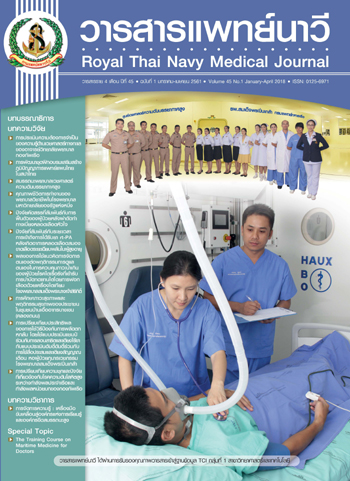The Effectiveness of Self Management on Fluid Overload Management for Chronic Kidney Disease Patients with Hemodialysis at Somdej Phranangchaosirikit Hospital
Main Article Content
Abstract
The purposes of this research were to study self-care management behavior of CKD patients with hemodialysis after being acquired and educated of fluid restriction and overload control guidelines. There were 21 qualified patients out of 32 CKD patients with hemodialysis at Somdej Phranangchaosirikit Hospital. The participants were each provide information for self management, a handbook of self-care management guideline, step by step care descriptions, a recording notebook for fluid and food consumption each day, a fluid measurement container, and additional self-care information of questions and answers. Data was collected by using assessment questionnaire of self-fluid control behavior of CKD patients. The statistical t-test was applied as the analytical research tool by using standard deviation and average value.
In conclusion, firstly the self-care fluid restriction management behavior of CKD patients with hemodialysis was found with the average value of 3.94 which was improved before the knowledge acquirement that shown the average value only 3.24, with resulting of statistical reliability of .05 significantly. Secondly the self-care fluid overload management behavior of CKD patients on the hemodialysis day was found the fluid overload average value of 2.68 which was improved before the knowledge acquirement that shown the average value from 2.97.
Article Details

This work is licensed under a Creative Commons Attribution-NonCommercial-NoDerivatives 4.0 International License.
References
Thanakitcharu P. Current situation of chronic kidney in Thailand. Journal of the Department of Medical Services 2015;40(5):5-18. (in Thai)
โรงพยาบาลสมเด็จพระนางเจ้าสิริกิติ์. สถิติผู้ป่วย พ.ศ. 2556-2558. ชลบุรี: โรงพยาบาลสมเด็จพระนางเจ้าสิริกิติ์; 2559
Dunbar-Jacob J, Erlen JA, Schlenk EA, Ryan CM, Sereika SM, Doswell WM. Adherence in chronic disease. Annu Rev Nurs Res 2000;18:48-90
Foley RN, Parfrey PS, Harnett JD, Kent GM, Murrey DC, Barre PE. Impact of hypertension on cardiomyopathy, morbidity and mortality in end-stage renal disease. Kidney Int 1996;49(5):1379-85
Lipetz MJ, Bussigel MN, Bannerman J, Risley B. What is wrong with patient education programs?. Nurs Outlook 1990;38:184-9
Creer LT. Self-management of chronic illness. Handbook of self-regulation. Californa:
Academic; 2000. p. 601-29
Chantapet Y. Effect of illness representation program on volume overload control among patients receiving hemodialysis in Thatpanom Crown Prince Hospital, Nakhonphanom Province. [Master’s Thesis, Faculty of Nursing]. Khon Kaen University; 2012. (in Thai)
Petchai T. Effects of using primary nursing with health information provision on health status of patients with chronic renal failure and satisfaction of nurse, hemodialysis units. [Master’s Thesis, Faculty of Nursing]. Chulalongkorn University; 2009. (in Thai)
Lorig KR, Holman H. Self-management education: history, definition, outcomes, and mechanism. Ann Behav Med 2003;26(1):1-7
Bandura A. Self-efficacy: the exercise of control. New York: W.H. Freeman; 1997
Kralik D, Koch T, Price K, Howard N. Chronic illness self-management: taking action to create order. J Clin Nurs 2004;13(2):259-67
Wagner EH, Brian AT, Davis C, MikenHindmarsh, Schaefer J, Bonomi A. Improving chronic illness care: translating evidence into action. Health Affairs 1999;20(6):64-78


